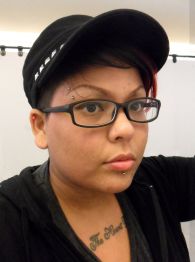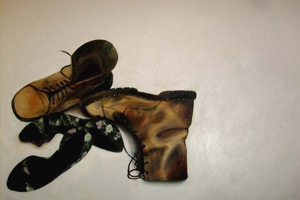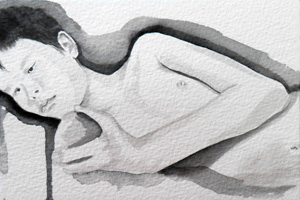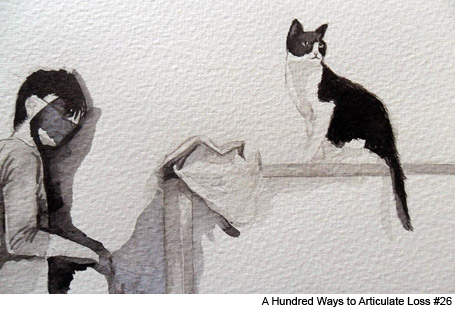For a long time now, we’ve been writing about Genevieve Chua as Singapore’s only openly lesbian artist. Now, there’s finally a new girl on the block: the multi-talented, multi-tattooed Tania De Rozario.
I first got to know Tania as a writer. She’s been regularly publishing her lush, sensuous poetry and prose on her blog, Quote the Emotion, as well as contributing to journals like QLRS, Softblow and GASPP: a Gay Anthology of Singapore Poetry and Prose.
This year, however, she came into her own as an artist, staging A Language of Longing, her first solo exhibition at the Substation Gallery. From 7 to 16 October, she displayed a collection of paintings, drawings and text installations, all inspired by relationships with former lovers and the emotional, physical and sexual bonds between women.
From 1 to 15 December, a selection of paintings from this exhibition will be going up at The Pigeonhole, an arts space/café at 52 and 53 Duxton Road. Friends and fans are invited not to an opening reception, but to a small closing party on Thursday 15 December, 7.30pm.
Tania also comes to us fresh from winning a national literary award. This month, she won First Prize for English Poetry in the Golden Point Awards for emerging writers. It’s the first time to our knowledge that a queer woman poet has scored the prize. Who knows what next year has in store?
æ: Age, sex, occupation, location?

Tania: 30, female, artist, writer, curator, in Singapore.
æ: When and how did you start writing? When and how did you start making art?
Tania: I've been practicing as an artist and writer for about a decade now, with my poetry/prose informing my paintings and vice versa. I did my degree in Fine Arts and have been working with images and text since then.
Commercially, my first long-term writing gig involved me ghost-writing ghost stories for a local publishing house over the course of a year when I was seventeen. I put myself through a large portion of school doing that… and taking my clothes off for other art students… but that is another story!
I've actually used images and text as a means of communication since I was a kid. I used to have a little whiteboard in the dining room on which I would write and illustrate little kiddy poems about how I was feeling. I preferred doing that to speaking to people. Haha – I guess I am still like that!

Collapse Like Shadows
æ: A lot of your work seems to be inspired by love and eroticism. Why?
Tania: I always deal with issues of love, loss and desire in my work – these are themes most of us can relate to and they transcend gender identity and sexual orientation. My textual installations in particular, while they are very much inspired by women I have been with, often suspend gender for readers and I always hope that this aids in viewers entering the work via their own memories.
I believe very much in the personal and in personal stories. Queer stories accumulated make up a series of histories that have been omitted by the larger narrative. I think is important to keep telling them.
æ: Could you talk about the concept and focus of the "A Language of Longing" series?
Tania: A Language of Longing features a series of oil paintings that spans three years of making, 65 ink drawings I started recently, and a text installation called A Hundred Ways to Say Your Name, in its third showing. All the work is inspired by relationships with former lovers and narrated through visual and textual depictions of body, gesture, language and personal belongings.
æ: What else inspires you?
Tania: Haha... you mean love and sex are not enough!?
Well, one thing that has always anchored my work is a line from the first page of Written on the Body in which Jeanette Winterson says that "A precise emotion seeks precise expression." The first time I read that, I knew that that was what I wanted to do with all my creative work – seek precise expression for precise emotion.
There are also lot of other people who inspire me but there is really no space with which to list them!

A Hundred Ways to Articulate Loss #35
æ: You recently received the Golden Point Award for your poetry. Could you talk about that experience?
Tania: It was great! Starhub had just cut my line ‘cos I had no money to pay my bill, so it was very timely! Haha!
No, but seriously, it was surprising and warming. There was a time in my teens when I never thought that a love poem written by a woman for another woman, would ever be published in the Straits Times. Well, then again, I don’t know if it was a really a love poem – it was about a mismatched couple. But it was full of love. Does that count?
æ: We’ve heard you’re also a curator of the annual women’s art event, Etiquette. Could you tell us about it?
Tania: I co-founded Etiquette together with Zarina Muhammad in May 2009. It is a multidisciplinary showcase that platforms art, writing and film by women. We established it for a number of reasons:
Firstly, I have always wanted to set up a platform that showcases works by women creatives because frankly, the statistics regarding women in the arts are still appalling.
Secondly, the actual idea for Etiquette (www.etiquette.sg) came about after the AWARE (www.aware.org.sg) EGM in May 2009, in reaction to the fact that those of us who had come to support the original members of the organisation and who were passionate enough to vocalise our outrage at it being steeplejacked by religious fundamentalists, were labeled hooligans in the papers the next day. I guess Za and I wanted to highlight the fact that in many situations, polite behaviour is not necessarily the most appropriate behaviour.
Etiquette aims to embody this ideology and for every event, we have selected work that deals with issues of gender in challenging ways. If you think about it, etiquette as a practice, revolves largely around codes of conduct that enable an individual to negotiate a social space without conflict and on a larger scale, a community or society to carry on, as is. Assuming the supposedly “natural” roles of our designated gender unquestioningly is also a form of etiquette that perpetuates existing power structures that need to be dismantled.
æ: Cool. So how's it been progressing so far?
Tania: Great! It has expanded in ways we never envisioned. So far, with logistical help from the Substation, we have platformed five events, showcased the works of 46 artists, writers, filmmakers and curators and have been warmed by the reception we have gotten. We were also humbled by many individuals who were willing to help support us logistically and who were enthusiastic about volunteering their time to the 2011 installment after seeing the first one in 2010.
æ: What plans do you have for the future?
Tania: Well, I do not make plans that go beyond six months so I can tell you what I will be working on till June 2012: I am hoping to finish my novella, Etiquette is working on its first anthology , a bunch of us are organising a multidisciplinary fundraiser for ACRES (www.acres.org.sg) and I am working on a number of separate projects with various artists. Other than that, world domination would be nice. But six months is cutting it a bit close...
To see A Language of Longing, visit The Pigeonhole at 52/53 Duxton Road between 1 and 15 December. The cafe's website is thepigeonhole.com.sg, and the closing party is at 7:30pm on Thursday 15 December.
To read more of Tania’s writing, visit her blog, Quote the Emotion, at chromeplatedheart.multiply.com/journal. To read about past editions of Etiquette, visit etiquette.sg
Ng Yi-Sheng is a poet and playwright, and winner of the Singapore Literature Prize in 2008 for his poetry anthology Last Boy.












 列印版本
列印版本










讀者回應
請先登入再使用此功能。